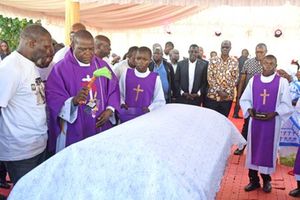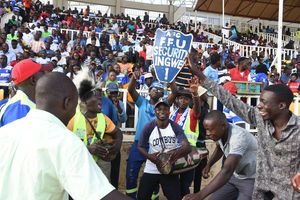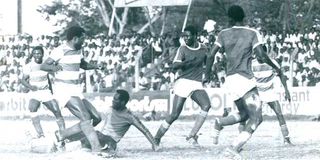
Lake Warriors goalkeeper Mickey Kenyatta (down) collects the ball from the feet of AFC Leopards striker Joe “JJ” Masiga during a league match in the 1980s at City Stadium in Nairobi.
From play-acting to use of secret codes, teams employ all manner of tactics in competitions to win.
The dictionary defines secret code as a system of symbols, letters, or numbers that represents a message in a secret way.
Secret codes can be used to transmit messages that need to be brief or kept secret. In football, coaches gesticulating animatedly during matches, or players passing on hand-written notes is a common sight in matches.
As far as use of secret codes in Kenyan football is concerned, no club has mastered the use of language barrier as a secret weapon to gain competitive advantage over their opponents as AFC Leopards did in the Kenyan Premier League in the 60s 70s and 80s.
In 1969, the Ministry of Culture and Social Services announced that football teams with tribal names would be excluded from activities run by Football Association of Kenya, much to the chagrin of clubs with an ethnic base.
But in 1980, Daniel arap Moi who had succeeded Jomo Kenyatta as president of Kenya ordered all tribal associations to disband themselves, and all associations with tribal names to change them to have a more national outlook.
In football, Maragoli FC changed to Mara FC, Ramogi FC changed to Lake Warriors, Gema FC became Transcom FC, and Abaluhuya Football Club became All Footballers Cooperative Leopards (AFC Leopards).
Before the order came, Luo Union and Gor Mahia had the tendency to sign players from the Luo community, while AFC Leopards recruited heavily from the Luhya community, and these teams deployed secrete codes and ethnic language as a weapon to beat opponents.
Peter Lichungu who played for AFC Leopards as a defender between 1982 and 1994 says that the team’s coaches, including the late Robert Kiberu from Uganda, encouraged his players to use their vernacular language during big matches, especially when playing arch-rivals Gor Mahia or Luo Union, and it yielded results. To date, Kiberu stands out as the club’s most successful coach.
Bu that tactic fell flat when AFC Leopards, which was based in Nairobi but mostly fielded Luhya players, came up against teams from Western Kenya such as Pan Paper FC from Bungoma, Ministry of Works from Kakamega, and later Mumias FC from Kakamega, Nzoia Sugar Bungoma, and Rivatex from Eldoret. These players could speak Luhya language just like their AFC Leopards counterparts, rendering the trick ineffective.
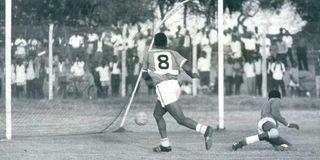
Barclays Bank striker shoots to score past Speedways FC striker J.J. Masiga Cup match at Nyayo National Stadium in 1990. AFC Leopards perfected the sue of secret codes in competitions to win matches in the 60s, 70s, and 80s.
Lichungu says it created a new problem which needed change of tack, and so AFC Leopards players employed a higher level of secret codes in language by using sheng, a Swahili and English-based cant mostly common among youth in Nairobi’s Eastlands area.
“Use of vernacular language worked well for us at AFC Leopards, but some teams started learning the meaning of our basic phrases, so we turned to gestures to complement verbal communication on the pitch,” Lichungu, who played for Kakamega High School before joining Motcom and later AFC Leopards, said. He also played for Harambee Stars.
“Gestures helped us convey meaning, emotion, and intention on the pitch. Gestures also helped us to reinforce messages and instructions on the pitch. For example, a striker would use gestures to indicate the direction in which he wanted the ball to be sent,” he says.
Lichungu says AFC Leopards coaches would relay instructions to players from the touchline in Luhya language to ensure the opposition did not get a hint of their strategies.
“They would address us in mother tongue, but we also had interpreters who helped the new players to clearly understand what they meant. Some of the new players got support from senior team members.”
Former Harambee Stars striker, Tony Lidonde, who played for AFC Leopards between 1979 and 1987, says the tactic worked for them to great effect when AFC Leopards came up against teams with no Luhya players in their squads.
“We commonly used Luhya words such as ‘hakhabira tawe’ (don’t let him pass the ball), ‘sena mundu’ (knock him down), ‘m’mbukulili ikulu’ (jump up high with him), ‘viritsila hakari habo’ (give me a quick through pass), ‘mala naye arikale hasi’ (flatten him completely), ‘raho’ (float the ball to me in the space in front), and ‘lera mpira’ (give me the ball now),” Lidonde says.
“Others were ‘kate ifula ikwe lufu lutuma’ or ‘khali imbula ikhuvi lukushi lulatuma’ (whether it rains, dust will swirl during the match), ‘ndi ikulu’ (give me a high ball), ‘kalukha inyuma’ (drop back now, I’m overlapping), and ‘mushebe’ (leave him for dead).”
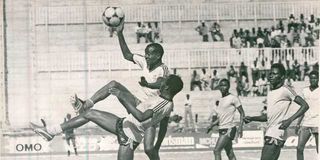
Abaluhya Football Club’s Joe Kadenge (right)shoots to score past Luo Union’s goalkeeper, John Baptists, on January 13, 1968. F
Lidonde reckons there were moments when the team’s captain Mahmoud Abbas, player who is from the Coast region of Kenya, could ‘lend’ the captaincy to Josephat Murila to do the talking in Luhya language.
Murila would jump at the opportunity to marshal the team’s defence, earning the name ‘controller.’ At the time, the team had Shadrack Oyando, Moses Okwaro, John Arieno, Patrick Shilasi, Pius Masinza, Peter Lichungu, Ineah Isabwa, and Nahashon Bushuru. Other team members were Abdul Barasa, Haggai Mirikau, Wilbeforce Mulamba, Ernest King Hassan, Moses Mulamba, and Peter Zimbo.
The wingers in that AFC Leopards team were Eliakim Ongoli, Jones Ndombi, Aggrey Lukoye, Noah Wanyama, Ben Musuku, Dan Musuku, Mike Amwayi, and Francis Kadenge, while the striking force was masharled by Joseph Jesse “JJ” Masiga, Lidonde, Paul Maungu, George Olubendi, and Patrick Shims.
Coded language aside, that Leopards team enjoyed success locally and internationally, and many of the team’s fans followers believe it was the best side.
Musuku brothers Dan and Ben were gifted dribblers, and strikers Masiga and Lidonde coordinated well with Kadenge and Amwayi.
But the club’s former official, Vincent Shimoli, believes the team currently lacks outstanding players.
“The Likes of Murila, Mulamba and J.J Masiga were gifted players who needed very little coaching. The array of talent Leopards had at their disposal enabled the team to win many titles.
“Today, AFC Leopards are conspicuously short of stars as compared to the past when most of our players could have easily walked straight into the starting squad in most teams playing in top European leagues,” he said.

